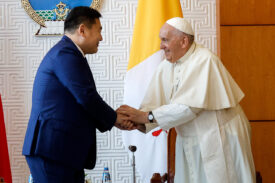
By Cindy Wooden
After paying tribute to Mongolian history at a statue of Genghis Khan outside the State Palace early Sept. 2, the pope invoked the “Pax Mongolica” of the 13th and 14th centuries when peace reigned throughout the conquered lands of the vast Mongolian empire.
In a country with only about 1,450 Catholics, just a few hundred people came to Sükhbaatar Square outside the State Palace to see the pope.
Yu Qian, a doctoral student from Beijing, was there “because every morning I do tai chi here and I saw they were having a ceremony.” He said he is not religious.
A group of a dozen Catholics from mainland China, wearing jackets that said, “Love Jesus,” also were present, but would not give interviews and folded up their small Chinese flags when television cameras approached.
An office of the Chinese Communist party issued an order forbidding Catholics from going to Mongolia for the papal visit. Cardinal-designate Stephen Chow Sau-yan of Hong Kong told Catholic News Service Sept. 1 that no bishop or priest from the mainland would be in Ulaanbaatar, but a few faithful might be able to cross the border.
Taize Brother Han-Yol came from South Korea. “As the Holy Father comes for this little flock, I said I have to go and stand in solidarity,” he said. The pope’s visit “is an encouragement not only for Catholics here, but for all Catholics of the region, including China.”
Cecilia Uugantsetseg, a Mongolian who became Catholic in 2004, was in the square early with her four children. “I’ve been waiting for Papa Francis,” she said.
After the formal welcome in the square, Pope Francis held a private meeting with Mongolian President Ukhnaagiin Khürelsükh in a ceremonial ger, sometimes referred to as a yurt.
The two leaders then joined several hundred leaders of Mongolian society and members of the diplomatic corps to exchange speeches. Both spoke of the need for peace.
“May Heaven grant that today, on this earth devastated by countless conflicts, there be a renewal, respectful of international laws, of the conditions of what was once the ‘Pax Mongolica,’ that is, the absence of conflicts,” the pope said.
He quoted a Mongolian proverb: “The clouds pass away, but the sky remains.”
“May the dark clouds of war be dispelled, swept away by the firm desire for a universal fraternity wherein tensions are resolved through encounter and dialogue, and the fundamental rights of all people are guaranteed,” the pope said.
“Here, in this country so rich in history and open to the sky, let us implore this gift from on high, and together let us strive to build a future of peace,” he said.
Mongolia, the president said, “stands for maintaining and strengthening global and regional peace and security and is pursuing a peace-loving, open, independent and multi-pillared foreign policy,” including by “actively engaging with our immediate and third neighbors.”
Both Pope Francis and Khürelsükh also noted Mongolia’s long tradition of religious tolerance.
Pope Francis presented himself as “a pilgrim of friendship,” one who arrives “quietly” in the world’s most sparsely populated country.
In Mongolia’s population of about 3.3 million people, Buddhism and shamanism are considered the traditional religions, although religious practice still has not recovered from 70 years of strict communist rule. Christianity is considered by many to be a foreign import or even a threat to the nation’s traditional culture.
In his meeting with national leaders, Pope Francis paid tribute to values all people of good will should share. And, urging care of the natural environment, he pointed to the wisdom modern Mongolians could draw from “the holistic vision of the Mongolian shamanic tradition, combined with the respect for all living beings inherited from Buddhist philosophy.”
Both, he said, “can contribute significantly to the urgent and no longer deferrable efforts to protect and preserve planet Earth.”
Religious values, he said, also are an antidote to “the threat represented by the consumerist spirit that nowadays, in addition to creating great injustices, leads to an individualistic mindset that cares little for others and for sound established traditions.”
But the pope also expressed hope that ongoing negotiations between the Vatican and Mongolia as well as new legislation might make it easier for Catholic missionaries to enter the country and build up their work not only evangelizing, but also providing education and a wide variety of social services.
